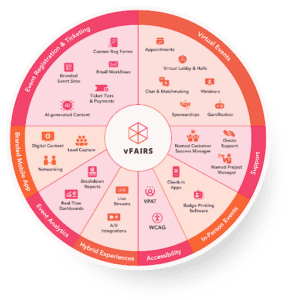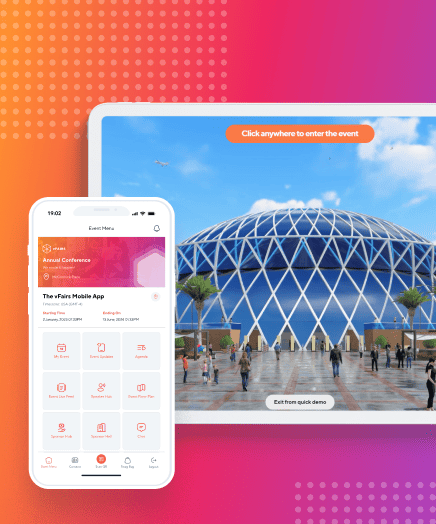Event technology has become the backbone of modern-day events, revolutionizing the way we plan, organize, and execute gatherings. The possibilities are expanding rapidly, from event registration and ticketing platforms to event apps, live streaming tools, and virtual reality experiences. With advancements in artificial intelligence, data analytics, and interactive technologies, event planners now have many tools at their disposal to create immersive and engaging experiences.
In this blog, we’ll rewind to explore the key event trends that transformed last year and fast forward to predict what’s on the horizon for 2024. From virtual events to AI personalization, the events industry is evolving fast. Read ahead to uncover the innovations reshaping how we embrace the future of events, one tech trend at a time.
Major Event Trends We Saw in 2023
In the dynamic landscape of events, 2023 emerged as a pivotal year, witnessing transformative event trends that reshaped the way we gather and engage. Here’s a closer look at the major event trends that defined the event industry and provided a glimpse into the future of gatherings:
1. The Explosion of AI in Events
In 2023, AI took the events industry by storm, revolutionizing how we plan and execute events. This wave of innovation primarily focused on enhancing productivity and efficiency. With the introduction of AI-powered tools, event organizers found efficient ways to promote and evaluate their events.

vFairs seamlessly integrated AI into event planning, offering efficient solutions through:
AI Assistant: Powered by ChatGPT, the vFairs tool became the ultimate ally for event organizers. With just a few inputs, it generated drafts for email campaigns, social media posts, PRs, and more. This streamlined the promotional process, saving time and effort while ensuring compelling marketing materials.
Webinar Summary & Chapterization Module: The vFairs tool introduced intelligent summarization and chapterization features to repurpose webinar content for various promotional channels. It helped create engaging summaries, highlights, and other content, perfect for in-event descriptions and post-event promotional materials. This not only captured the essence of the event but also kept attendees and potential participants intrigued.
AI Reporting Chatbot: Understanding event metrics became effortless with the introduction of an AI reporting chatbot. Event organizers could obtain specific data and metrics by asking the chatbot a question. The chatbot responded in a conversational tone, simplifying the post-event reporting experience. It was more than just data; it was actionable insights delivered in a user-friendly manner.
This fusion of AI and events didn’t just enhance productivity; it transformed the attendee experience and streamlined the post-event analysis.
2. In-person Events as Table Stakes
Amid the dynamic event landscape of 2023, in-person gatherings became indispensable, but with a transformative twist. Onsite event technology played an important role in elevating the traditional event experience. Onsite event tech empowered organizations to craft unparalleled onsite experiences through innovative tools.

vFairs took its product forward with these advancements:
Improved Mobile Event App: Attendees navigated events seamlessly using interactive floor maps, pre-event networking features, and on-site chat functionalities. From booth interactions to scheduling meetings and exchanging contacts, the event mobile app streamlined connections, enhancing event objectives efficiently.
Lead Capture App: Gone are the days of business cards and disconnected leads. Lead capture apps revolutionized the process by enabling quick contact code scans, generating leads instantly. Moreover, these apps provided a structured approach, allowing organizers to score leads and add contextual notes, ensuring meaningful follow-ups.
Badge Printing & Check-In: Long check-in lines were a thing of the past. QR code scans expedited the check-in process, swiftly admitting attendees. On top of that, badge printing became a matter of seconds, enhancing efficiency and ensuring a smooth start to the event.
3. The Rise of Virtual Events as a Driver for People Ops

One of the standout event trends of 2023 was the remarkable rise of virtual events as a driving force behind people operations. These digital gatherings went beyond traditional boundaries, expanding their influence and impact across various facets of HR:
Global Candidate Recruitment: With virtual events, geographical limitations became a thing of the past. Organizations leveraged the power of online platforms to reach, interview, and hire talent from all corners of the globe, transforming the recruitment process into a worldwide endeavor.
Onboarding and Training Remote Employees: As remote work became the norm, virtual events were instrumental in onboarding and training employees, ensuring seamless integration and access to essential resources no matter where they were located.
Showcasing Employee Benefits Options: Communicating and promoting employee benefits took on a new dimension through virtual events. Companies used these platforms to effectively showcase their benefits packages, educating and engaging employees about the perks they could access.
4. Increased Flexibility in Attendee Experiences
In 2023, attendees found themselves at the center of event experiences, enjoying unprecedented levels of flexibility and personalization. Events became tailored journeys, allowing participants to craft their own unique experiences in the following ways:
Choose How to Attend: Attendees gained the freedom to decide whether they wanted to join virtually from the comfort of their homes or participate in person, allowing for a diverse range of attendance options tailored to individual preferences and circumstances.
Opt for Live or On-Demand Participation: The traditional boundaries of event schedules blurred as attendees could opt to participate in real-time during live sessions or catch up later at their convenience through on-demand content, ensuring that nobody missed out on valuable insights.

Dive into Varied Sessions and Tracks: Events became multifaceted, offering a myriad of sessions and tracks catering to diverse interests. Attendees could select from an array of topics, allowing them to delve deep into subjects that mattered most to them, fostering engaged learning and discussion.
Explore Roundtables, Breakouts, and Workshops: Beyond traditional sessions, attendees had the opportunity to engage in interactive roundtables, immersive breakouts, and hands-on workshops. These intimate settings encouraged meaningful discussions and skill-building, enabling attendees to actively participate and contribute.
This level of customization empowered attendees, turning passive participation into an active, engaging, and tailored event experience. In 2023, events were no longer one-size-fits-all; they became platforms where attendees could curate their journey, ensuring that every moment was valuable and relevant to their needs and interests.
5. Virtual Events & Content Marketing to Drive Interest in Onsite Events

Another one of the standout event trends of 2023 was the dynamic synergy between virtual events and content marketing, serving as a driving force for generating interest in onsite gatherings. Organizers explored innovative strategies and content to entice registrants towards the physical events, and this trend was marked by several key approaches:
Leveraging Virtual Events as Precursors: Virtual events were strategically positioned as exciting precursors to larger in-person gatherings. These digital experiences were crafted to offer attendees a taste of what to expect at the onsite event, creating a buzz and anticipation.
Webinars as Interest Builders: The power of webinars in building interest cannot be overstated. Event planners increasingly utilized webinars as a vehicle to share valuable insights, showcase event highlights, and engage with potential attendees, further stroking their curiosity.
Harnessing Speaker Thought Leadership: A new dimension emerged as speakers’ social media reach and thought leadership was harnessed to drive interest. Collaborating with speakers to actively promote the event on their social channels brought valuable attention and credibility to the event.
These strategies collectively transformed how organizers approached marketing their onsite events, making the journey from virtual engagement to in-person participation a seamless and enticing one. As we look to the future, this trend is poised to play an even more significant role in redefining event trends for marketing dynamics.
6. Event Sites Optimized for Registrations
In 2023, event hosts embraced cutting-edge tools to create bespoke, branded event sites that not only reflected the essence of the event but also provided intuitive navigation for attendees.

To incentivize action and boost registration numbers, event organizers introduced enticing offers such as group discounts, early bird pricing, and exclusive VIP tickets. Attendees were motivated to secure their spots promptly, knowing they could enjoy significant savings or exclusive perks.
Moreover, organizers recognized the importance of flexibility in pricing structures. They adopted a strategic approach by offering a-la-carte pricing options alongside traditional package deals. This flexibility empowered attendees to tailor their event experience according to their preferences and budget, ensuring a personalized and inclusive registration process.
In this era of event trends & innovation, the synergy of user-centric design, creative incentives, and flexible pricing strategies not only streamlined registrations but also elevated attendee satisfaction, setting a new standard for seamless event participation.
7. Heightened Demand for Speaker Management
Speaker management marked a significant shift in how events were curated and experienced this year. Event organizers and attendees alike recognized the pivotal role that skilled speakers played in shaping the narrative and atmosphere of gatherings.
Exceptional speakers weren’t just a component of events; they became the focal point, transforming ordinary sessions into captivating journeys of knowledge and inspiration. Organizers, more than ever, sought out individuals who could seamlessly blend expertise with engaging presentation styles. These speakers were not merely conduits of information; they were storytellers, thought leaders, and motivators rolled into one.
With event trends like these, the demand for proficient presenters, moderators, and panelists surged across conferences, seminars, and virtual events. Companies and organizations, keen on delivering impactful messages, scoured the globe for individuals who could articulate complex ideas with clarity and passion. The bar was raised higher, leading to a competitive landscape where speakers were not just speakers; they were the architects of memorable event moments.
As a result, events became more than just platforms for information dissemination. They transformed into arenas where ideas collided, where expertise was shared, and where attendees were not just passive listeners but active participants in enriching conversations. Engaging speakers didn’t just deliver talks; they fostered connections, inspired change, and left a profound impact on their audiences.
Event Trends Coming Up in 2024
Looking ahead to 2024, the events landscape is gearing up for some exciting shifts, all aimed at enhancing attendee experiences and event outcomes. Here are some event trends you can expect in the coming year:
1. Expansion of AI Use Cases

In 2024, the evolution of AI is set to take a significant leap forward. While AI in 2023 primarily centered around automation and productivity, this upcoming event trend is geared toward decision assistance, promising a more intuitive and intelligent event experience. Here’s what to expect:
Content Repurposing Made Effortless: Transforming webinar content will be as simple as a click, allowing event organizers to repurpose valuable insights with ease.
Swift Event Setups with AI Prompts: AI prompts will streamline event setups, ensuring faster and more efficient preparations, and leaving organizers with more time to focus on the event’s core elements.
Deeper Data Analysis and Event Performance Insights: Dive into in-depth data analysis powered by AI insights, gaining valuable takeaways about event performance. Uncover patterns, trends, and audience preferences, enabling informed decisions for future events.
This new wave of AI-powered technologies will not only enhance productivity but also empower event organizers with intelligent decision-making tools, marking a transformative shift in the way events are planned and executed.
2. Higher Demand for Self-Serve Event Platforms

Anticipate a surge in the demand for self-serve event platforms in 2024. Event owners are yearning for increased control over their event technology, leading to the rise of platforms that empower them in various ways:
Create Event Sites Through Self-Serve Modules: Event organizers will have the flexibility to craft personalized event sites using user-friendly self-serve modules, tailoring the platform to their specific needs.
More User-Friendly Customization Tools: Expect the introduction of intuitive customization tools that make it effortless for event planners to modify layouts, designs, and content, ensuring a seamless representation of their brand.
More Features to Support Niche Event Goals: These platforms will offer an array of features catering to niche event objectives. Whether it’s advanced networking capabilities, interactive sessions, or specialized analytics, event owners will find tools tailored to their unique requirements.
In essence, 2024 will witness a paradigm shift where event owners take the reins, shaping their events precisely as they envision, thanks to the evolution of self-serve event platforms.
3. Events As A Reliable Source of First-party Data
In the coming year, events will emerge as invaluable sources of first-party data, gaining unprecedented importance in the wake of a cookie less future. With cookies becoming obsolete, event data takes the spotlight, offering deep insights into attendee behavior and preferences.

Event organizers will harness this wealth of information through:
Event Reporting Dashboards: Real-time analytics will capture in-event trends and traffic patterns, providing a comprehensive overview of attendee engagement.
In-Event Feedback Channels: Interactive surveys and polls will enable instant feedback, allowing organizers to gauge audience sentiments, preferences, and event satisfaction levels, in the moment.
User Demographics & Preferences: Registration data will yield valuable user demographics and preferences, empowering businesses to tailor their events precisely to their audience’s needs.
This shift not only underscores the significance of events in the data-driven landscape but also highlights their pivotal role in understanding and connecting with audiences.
4. Hosts Creating New Ways for Attendees to Network

In 2024, event hosts are on a mission to foster more meaningful connections among attendees, seeking out opportunities for what we like to call “planned serendipity.” Here’s how they plan to achieve it:
Connecting Based on Focused Topics: Attendees will be able to join breakout sessions and roundtables, allowing them to connect with like-minded individuals who share a specific interest.
Smart Matchmaking: Innovative matchmaking tools will bring together attendees with similar interests, creating tailored networking experiences.
Simplified 1:1 Networking: Expect a seamless 1:1 networking experience through chat, meeting scheduler, and contact exchange tools. Making connections has never been easier, ensuring that every encounter counts.
5. Events As A Driver of Community
In 2024, events are anticipated to serve as catalysts, nurturing communities that thrive year-round. Organizations are embracing a dynamic approach, hosting not just one major event but a constellation of smaller touchpoint events throughout the year. These events create intimate spaces for meaningful connections.

Moreover, the advent of advanced tools is reshaping community-building and the event trends for 2024. Social media platforms and live feeds are abuzz with activity, fostering connections and conversations. These tools empower attendees, connecting them with robust networking, meeting, and matchmaking features.
It’s not just about the event day; it’s about fostering a sense of belonging and camaraderie that extends far beyond, turning events into the heartbeat of enduring communities.
6. Event Content As A Key Revenue Driver for Businesses

In the year ahead, businesses are set to harness the power of event content as a vital revenue generator, both during and after events making this one of the key event trends in 2024. Here’s how event owners are poised to make the most of this opportunity:
Leveraging AI-powered Tools: Event owners will utilize AI-driven tools to create and repurpose presentations, ensuring that the content remains fresh, engaging, and tailored to the audience.
Seamless E-commerce Integration: Event platforms will offer features like product listings, shopping carts, and order submissions, making it easy for attendees to explore and make purchases directly within the event space.
Lead Generation and Conversion: Dedicated apps will be instrumental in capturing and converting leads, facilitating meaningful connections, and ensuring a strong ROI for event owners.
On-Demand Events: The flexibility of hosting events on-demand will become a norm, allowing attendees to access content at their convenience, further increasing revenue opportunities.
E-commerce, sales, and marketing tools will take center stage as event hosts strategically utilize events as primary drivers of both sales and revenue. This shift will manifest in real-time purchases and orders during events, as well as in post-event lead generation and relationship building, establishing a seamless and sustainable revenue stream for businesses.
7. Increased Need for Modular Event Tech

Demand for adaptable event technology is growing. Event owners will seek a scalable platform to host a diverse range of events, catering to different needs throughout the year and will be one of the most important event trends in 2024. This platform will offer:
Access Overview Dashboards for Multiple Events: Event owners can conveniently oversee multiple events from a single dashboard, ensuring a seamless and organized management process.
Flexible Registration & Ticketing Tools: The flexibility to tailor registration and ticketing processes to specific event requirements such as tier pricing, hotel bookings and accommodation management ensuring a more personalized experience for attendees.
Hosting Virtual, In-person, and Hybrid Events Through One Platform: A unified solution to host various event formats, whether virtual, in-person, or hybrid, streamlining event planning and execution.
8. Hosts Opting For More Tech-Friendly Venues
In 2024, event hosts are leaning towards venues designed for the digital age. Immersive event spaces are becoming increasingly popular, offering attendees an unparalleled experience. These venues with state-of-the-art technology, provide seamless integration for various tools.
From interactive in-person venues to onsite gamification, scavenger hunts, and leaderboards, attendees can expect engaging activities. Additionally, mobile apps and high-touch tools are readily available, ensuring attendees remain captivated and connected throughout the event. Get ready to step into a new era of events with event trends, where immersive venues and cutting-edge technology redefine the way we gather and interact.
9. Inclusivity Is Top-of-mind for Event Hosts

In 2024, inclusivity will be a top priority for event hosts. Such event trends are committed to making events accessible to everyone, embracing the following aspects:
Accessible Event Technology: Event tech will be designed with accessibility in mind, ensuring that all attendees can easily navigate and engage with digital tools.
Venue Accessibility & Food/Beverage Options: Venues will prioritize accessibility, from ramps and elevators to inclusive food and beverage choices, catering to various dietary preferences and restrictions.
Features for Multilingual Audiences: To accommodate a diverse audience, events will incorporate features for multilingual participants, breaking language barriers and ensuring everyone feels welcome.
Wrapping Up
The future of event planning holds exciting possibilities as technology continues to advance and attendee expectations evolve. By staying informed about current event trends, event professionals can tap into the power of innovation, accessibility, AI, event technology, and personalization to craft extraordinary experiences that resonate with attendees long after the event concludes.
Embracing these event trends is not merely about staying ahead of the curve; it’s about setting the stage for success and creating lasting memories that will shape the future of event planning. With a focus on immersive experiences, hybrid event solutions, personalized engagement, and sustainable practices, event professionals can elevate their events to new heights, leaving a profound impact on attendees.
Watch and decode more event industry trends here:




